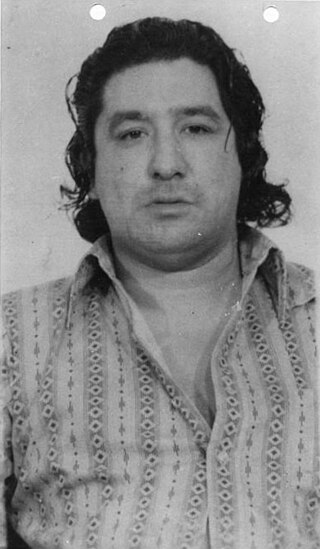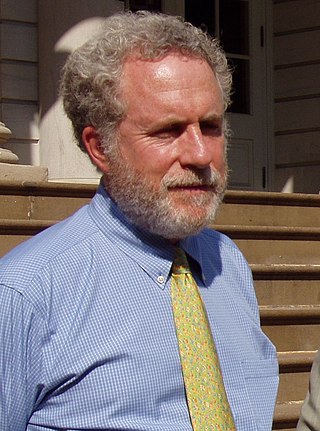Related Research Articles

Leonard Peltier is a Native American activist and a member of the American Indian Movement (AIM) who, following a controversial trial, was convicted of two counts of first-degree murder in the deaths of two Federal Bureau of Investigation (FBI) agents in a June 26, 1975, shooting on the Pine Ridge Indian Reservation in South Dakota. He was sentenced to two consecutive terms of life imprisonment and has been imprisoned since 1977. Peltier became eligible for parole in 1993. As of 2022, Peltier is incarcerated at the United States Penitentiary, Coleman in Florida.
Idiolect is an individual's unique use of language, including speech. This unique usage encompasses vocabulary, grammar, and pronunciation. This differs from a dialect, a common set of linguistic characteristics shared among a group of people.

Forensic linguistics, legal linguistics, or language and the law, is the application of linguistic knowledge, methods, and insights to the forensic context of law, language, crime investigation, trial, and judicial procedure. It is a branch of applied linguistics.

Sha Na Na was an American rock and roll and doo-wop revival group formed in 1969. The group performed a song-and-dance repertoire based on 1950s hit songs that both revived and parodied the music and the New York City street culture of the 1950s. After gaining initial fame for their performance at the Woodstock Music and Art Fair, made possible with help from their friend Jimi Hendrix, the group hosted Sha Na Na, a syndicated variety series that ran from 1977 to 1981.
Joseph Leo Gormley was the chief of chemistry and toxicology for the FBI.

Peter J. Neufeld is an American attorney, co-founder, with Barry Scheck of the Innocence Project, and a founding partner in the civil rights law firm Neufeld Scheck & Brustin. Starting from his earliest years as an attorney representing clients at New York's Legal Aid Society, and teaching trial advocacy at Fordham School of Law from 1988 to 1991, he has focused on civil rights and the intersection of science and criminal justice.

"At the Hop" is a 1950s pop song written by Artie Singer, John Medora, and David White and originally released by Danny & the Juniors. The song was released in the fall of 1957 and reached number one on the US charts on January 6, 1958, becoming one of the top-selling singles of 1958. "At the Hop" also hit number one on the R&B Best Sellers list. Somewhat more surprisingly, the record reached #3 on the Music Vendor country charts. It was also a big hit elsewhere, which included a number 3 placing on the UK charts.
Frederick Dennis Greene was an American singer who was a member of Sha Na Na who were formed in 1969 at Columbia University in New York as the Columbia Kingsmen. The name change to Sha Na Na occurred because of another group with a similar name, which was known for the song "Louie Louie".
Scott Powell, born August 13, 1948 in Dallas, Texas, was formerly an American Rock musician/singer. He later pursued a career as an orthopedic surgeon.

Scott Simon, also known as Screamin' Scott Simon, is an American pianist, who had been Sha Na Na's piano-player, from April 1970 until the band's disbandment on December 5, 2022.
Linguistics is the scientific study of language. Linguistics is based on a theoretical as well as a descriptive study of language and is also interlinked with the applied fields of language studies and language learning, which entails the study of specific languages. Before the 20th century, linguistics evolved in conjunction with literary study and did not exclusively employ scientific methods.
Carole Elisabeth Chaski is a forensic linguist who is considered one of the leading experts in the field. Her research has led to improvements in the methodology and reliability of stylometric analysis and inspired further research on the use of this approach for authorship identification. Her contributions have served as expert testimony in several federal and state court cases in the United States and Canada. She is president of ALIAS Technology and executive director of the Institute for Linguistic Evidence, a non-profit research organization devoted to linguistic evidence.
Alan Cooper is an American religious scholar and former musician who was the provost of the Jewish Theological Seminary of America (JTS), an academic institution that teaches Jewish studies and one of the centers for Conservative Judaism. He is also the Elaine Ravich Professor of Jewish Studies at JTS.

John Fair "Jocko" Marcellino is an American singer, musician, songwriter, producer and actor best known as one of the founders of the American rock and roll group Sha Na Na. He performed with Sha Na Na at the original Woodstock Festival, in the movie Grease and on their eponymous syndicated TV show.
Roger Wellington Shuy is an American linguist best known for his work in sociolinguistics and forensic linguistics. He received his BA from Wheaton College in 1952, his MA from Kent State University in 1954, and his PhD from Case Western Reserve University in 1962, where he studied regional dialectology with Raven I. McDavid, Jr. Shuy took additional linguistic courses at the University of Michigan and Indiana University.

Suspicious Partner is a 2017 South Korean television series starring Ji Chang-wook and Nam Ji-hyun, with Choi Tae-joon and Kwon Nara. It aired on SBS from May 10 to July 13, 2017, at 22:00 (KST) on Wednesdays and Thursdays for 40 episodes.
James R. Fitzgerald is an American criminal profiler, forensic linguist, and author. He is a retired FBI agent and best known for his role in the UNABOM investigation, which resulted in the arrest and conviction of Ted Kaczynski.

A Journey to the Center of the Mind (JCM) is a book series authored by James R. Fitzgerald, retired FBI agent, criminal profiler and forensic linguist. The series, published by Infinity Publishing between 2014 and 2017, consists of three volumes detailing chronologically the life and career circumstances that led to Jim Fitzgerald's involvement in the FBI's UNABOM investigation, which ultimately resulted in the arrest and prosecution of Theodore Kaczinski, also known as the Unabomber.

Elliot Cahn is an American singer, guitarist, entertainment attorney, and personal music manager best known for being one of the founding members of the Doo-wop group, Sha Na Na (1969–1973). As an entertainment attorney he has represented such artists as The Offspring, Papa Roach, and Rancid and was the personal manager of the band, Green Day, among others.
Edwin "Ed" Goodgold was an American writer, music industry executive, academic administrator. He is known for coining the term "trivia" in 1965. He was also the first manager of Sha Na Na.
References
- 1 2 3 4 Kim, Wook (2012-09-07). "Robert Leonard - School of Rock: 10 Supersmart Musicians". Time. Retrieved 2018-02-05.
- 1 2 3 4 Leonard, Robert (April 10, 2017). "Forensic Linguistics:Applying the Science of Linguistics to Issues of the Law" (PDF). Hofstra University .
- ↑ Kim, Wook (2012-09-07). "School of Rock: 10 Supersmart Musicians". Time. Retrieved 2019-04-13.
- ↑ "Forty years after Woodstock, original Sha Na Na alumni have reunion". MassLive. 25 September 2010. Retrieved 2018-04-07.
- ↑ Hitt, Jack (2012-07-23). "Words on Trial". The New Yorker. Retrieved 2019-04-13.
- ↑ Kim, Wook (2012-09-07). "School of Rock:10 Supersmart Musicians". Time. Retrieved 2019-04-13.
- ↑ "Professor Sha Na Na". The Washington Post. 2006-05-08. ISSN 0190-8286 . Retrieved 2018-04-07.
- 1 2 Finn, Robin (2008-06-15). "A Graduate of Sha Na Na, Now a Linguistics Professor". The New York Times. ISSN 0362-4331 . Retrieved 2018-04-07.
- ↑ "Features | Columbia College Today". www.college.columbia.edu. Retrieved 2022-04-27.
- ↑ Huffman, Alan (November 5, 1995). "In Memoriam: William Diver". LINGUIST List. 6: 1560. Archived from the original on August 4, 1997.
- ↑ "Dr. Robert Leonard". Forensics Consultants, LLC. Archived from the original on 8 January 2014. Retrieved 7 January 2014.
- ↑ "CV of Robert Leonard" (PDF). October 2020.
- ↑ Leonard, Robert A.; Ford, Juliane E. R.; Christensen, Tanya Karoli (2017). "Forensic Linguistics: Applying the Science of Linguistics to Issues of the Law" (PDF). Hofstra Law Review. 45 (3): 881–897.
- ↑ "Conflicting clues a hurdle". Daily Camera. 13 August 2009. Retrieved 11 November 2020.
- ↑ Arias, Jeremy (2013-04-12). "Charlene Hummert, died at the hands of her husband: notorious murders". PennLive.com. Retrieved 2018-05-15.
- ↑ Diaz, Joseph; Valiente, Alexa (9 October 2015). "How a Social Media Feud Led to the Murder of a Young Tennessee Couple". ABC News. Retrieved 11 November 2020.
- ↑ Polyglot Conference (25 November 2015). "Rob Leonard - The Groundbreaking Science of Forensic Linguistics". YouTube. Retrieved 11 November 2020.
- ↑ "Sha Na Na founder helps hunt criminals". TODAY. 4 May 2006. Retrieved 11 November 2020.
- ↑ "Robert A. Leonard, Ph. D." Hofstra University. Retrieved 7 January 2014.
- ↑ Tabios, Eileen (September 10, 1979). "Sha Na Na's Leonard returns to Columbia as a Swahili prof". Columbia Daily Spectator.
- ↑ Kitchen, Patricia (November 29, 2007). "The professions: From Woodstock to a novel life, in so many words" (PDF). Newsday . Archived from the original (PDF) on 8 January 2014.
- ↑ Neena, Samuel (2012-09-06). "Reading Between the Lines" (PDF). hofstra.edu. Retrieved 2018-02-04.
- ↑ Hamilton, Phyllis J. (6 July 2011). "Order Denying Motion for Preliminary Injunction" (PDF). Justia.
- ↑ Rogers, John (February 7, 2011). "College classrooms replace stages for rock stars". Salon.
- ↑ Shuy, Roger (November 7, 2009). "FYI: New book series: Language and the law". LINGUIST List. 20: 3821. Archived from the original on May 19, 2015.